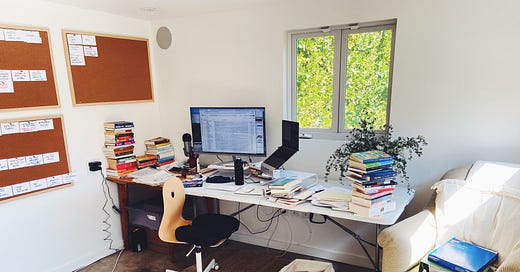On Monday, 77 hours and 38 minutes from now—assuming things go to plan, which I no longer do—I’ll be careening upward inside a great tin can, hearing the high-pitched whine of the wheels retracting into the plane’s belly. Berlin bound, at last.
Yesterday morning I had to get to some editing work, but I couldn’t pull myself away from the videos of firebombs spraying down onto a brushy coast in Ukraine and bumper to bumper traffic going one direction—away from homes. I felt powerless despair, the futility of my artistic personality, terror at the war growing and engulfing the world. Then, I walked into the kitchen to get more water and looked at the lime tree in my sister’s backyard, which is newly covered with tiny white blossoms. A bee landed on a petal, probing around in the pollen and the sky was a cold-for-LA, crystalline blue. I sat back down at my computer and closed the New York Times tab, sent some texts about making plans for after I arrive in Berlin, and got to work. The poem “We Lived Happily During the War” by Ukrainian-American poet Ilya Kaminsky perfectly captures this contrast between the quotidian and war’s terror.
It feels strange to write about the small scope of my life when Russia has invaded Ukraine. Seeing the strikes from helicopters, the pictures of cars jammed trying to leave, I feel both heartbroken and jarred. Inside my chest there is joy about finally beginning a new chapter jammed alongside grief for the Ukrainians.
Contrasting emotional bedfellows isn’t a new experience for millennials. We were taught young how to telescope between the personal and the geopolitical. Between coming of age after 9/11, graduating from college into the recession, and spending our 30s in a pandemic, it’s become second nature to titrate between despair at the state of of the world while investing in our own stories. Of course, this isn’t generationally unique, but a facet of being human.
Still, when confronted with the immense gulf between my reality and the tragedies on the news, I butt up against is the feeling that it’s immoral to “live happily during the war.” Then I remember a poem we read on the first day of French literature during my junior year of high school with Monsieur Bazin, a man who looked like a retired French James Bond. I can’t remember the title of the poem or the poet, unfortunately, but I remember that it was about a man whose wife dies in childbirth. The poem details how at first, grief engulfs his elation about his son’s birth. In the end, he has to choose laughing because his son is alive. As I remember it, the lesson isn’t that the man wholly excises grief, but that he lets the joy direct him back toward living.
So, I check the news, I return to packing, repeat. One thing that comforts me is that in only four days, I’ll be exiting this long state of limbo. I’m grateful for transitional acts that embody this life change. I’m choosing which books get to make the journey and which will wait in a cardboard box. I’m deciding which 100 pounds of my things will join me on the flight. Even the changing of planes in Munich is welcome since getting on a direct flight would be too easy for what feels monumental. And yet, it’s not as though I’ll step off the plane and walk into my old life. I’ve been gone for years. I am scared about feeling intense loneliness and I still get nervous about impromptu interactions in German. None of these are reasons not to do the thing, though in the exquisite comfort of my mother tongue and seeing my sister everyday, I do sometimes wonder why I am moving to another country simply because I love it.
Part of my excitement about this transition is for the clear line it draws between the present and the past. Perhaps it’s the pandemic, so much time alone, a lack of novelty and adventure, but I’m ready for a new way of being in my mind. With this move, I’d like to say goodbye to the routine anxieties and instead trying on a completely different mindset.
For instance, I’ve mentioned having time-space synesthesia before, and one of the ways that manifests is that I can see the expanse of March spreading out before me, totally emptied of plans. My normal reaction is to see that as a failing and to try to fill it with as many social interactions as I can: dates auf deutsch, German classes, coffees with friends of friends. Instead of that, I’m going to just get there and see. I’m just trying on being the kind of person that trusts things will work out how they should.
In fact, I’m “just trying on” a whole wardrobe of new emotional clothes. Like: What would someone who doesn’t worry about their language skills do? Or, what would someone who didn’t worry about being able to make new friends and build community do? And the vintage question I’m ready to resurrect from college, when I’d have barely started a 15 page paper the day before it was due. I’d ask myself “what’s the worst that could happen?” Usually, the answer wasn’t death.
No, the answer is to continue to live. Our personal dramas will always unfold on the world’s chaotic stage. Meanwhile, we try on new ways of being. We revert to old habits. I see it as though each of us is on a trampoline, bouncing up and down again and again, drawing a undulating line of life in the air as the Earth rotates beneath us. I like to picture what all of these sine waves would look like mapped on top of each other, all howevermanybillion rippling curves in differing peaks and valleys threaded together, containing stories of lives spent in the space between grief and joy.





